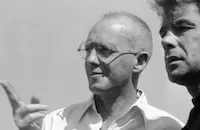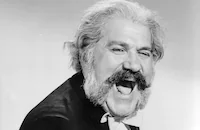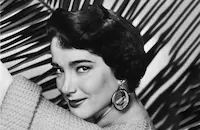Red, Hot and Blue
Brief Synopsis
Cast & Crew
John Farrow
Betty Hutton
Victor Mature
William Demarest
June Havoc
Jane Nigh
Film Details
Technical Specs

Synopsis
Aspiring actress Eleanor Collier is taken hostage by gangster Hair-Do Lempke, who demands that she name his boss's killer. Eleanor is unable to name the murderer, but buys time by telling Lempke about her last six months in New York City: Eleanor moves in with fellow actresses No-No and Sandra, both of whom are unnerved by Eleanor's relentless good cheer and clumsiness. Eleanor regularly argues with her boyfriend, theater director Danny James, who is appalled by her shameless desire for fame and fortune without regard for the integrity and quality of a work. Despite Danny's protests, Eleanor's agent Charlie Baxter arranges for her to date Alex Creek, a baseball team owner who regularly finances the careers of starlets. While at a ritzy nightclub with Alex, Eleanor gets drunk and tries to ingratiate herself with various celebrities, including columnist Laddie Corwin and ne'er-do-well Barney Stratum. Eleanor only succeeds in getting a good soaking when Alex's wife unexpectedly appears and indignantly dumps a bucket of ice on her. The next day, Danny's theater group is selected to perform for a prestigious upstate summer stock program, and he and Eleanor celebrate at Perrin's, a restaurant famous for its celebrity clientele. Eleanor catches the eye of gangster Bunny Harris, who is discussing with Laddie and Charlie his plans to produce a play. After Danny leaves, Charlie eagerly introduces Harris to Eleanor, who invites Harris to attend a rehearsal at Danny's theater. Harris is bored by Danny's production of William Shakespeare's Hamlet , which is being performed for the summer stock producers. To spice things up, Eleanor insists that the group perform their "jazzed-up" song-and-dance rendition of Hamlet . Afterward, Danny proposes to Eleanor, but she rejects him because she thinks he pities her because the summer stock producers want to replace her with a more famous actress. Later that night, Sandra convinces Eleanor to accept Harris' invitation to read a new script at his apartment. Eleanor regrets her decision once she is alone with Harris, and starts to leave, but Harris reassures her that his interest is strictly business and encourages her to ask Danny to join them. While she is behind Harris' bar making her call, a gangster pushes his way through the open apartment door and shoots Harris in the back. During questioning by police, Eleanor is shocked to learn that Harris was a gangster. Eleanor is then kidnapped by Lempke, but before he takes her from her apartment, she uses her lipstick to draw a cartoon-likeness of the gangster onto the ironing board, with a note reading "They got me, he has a scar and plays piano." No-No, Sandra and Danny start an investigation of their own, and convince Laddie to print Eleanor's drawing in the newspaper. Lempke, meanwhile, puts his toughest thug to work beating a confession out of Eleanor, but she overpowers her oppressor with jiu-jitsu techniques she learned from her Marine brother. Danny, meanwhile, interviews piano tuners across town until one identifies the face as one of his clients in the warehouse district. Based on this clue, Danny drives into a warehouse district and repeatedly honks his distinctive car horn. When Eleanor hears the horn, she starts to sing loudly for the gangsters, and Danny finds her and gains entrance by impersonating the piano tuner. Eleanor and Danny beat the gangsters into submission, and Eleanor then calls Laddie's live television show to report her location, after which Charlie announces that she is to appear with the theater company in the summer stock show. Later, Eleanor, finally seeing eye-to-eye with Danny, proposes marriage.

Director

John Farrow
Cast

Betty Hutton

Victor Mature

William Demarest

June Havoc

Jane Nigh

Frank Loesser

William Talman
Art Smith
Nraymond Walburn

Raymond Walburn

Onslow Stevens
Barry Kelley
Robert Watson

Jack Kruschen
Joseph Vitale
Percy Helton
Erno Verebes
Philip Van Zandt
Henry Guttman
Don Shelton
Herschel Daugherty
Dorothy Abbott
Julia Faye
John Marchak
Pepito Perez
James Cornell
John Sheehan
William Hall
James Davies

Douglas Spencer

Noel Neill
Paul Lees
Joey Ray

Betty Adams
Diane Stewart
Geraldine Jordan
Lester Dorr
Maxine Gates
Joe Whitehead
Rita Lupino
Billy Daniels

James Burke
Harland Tucker
Roscoe Behan
Tim Ryan
Edith Leslie
Len Hendry

Lee Phelps
Harry Rosenthal
Phil Boutelje
Joseph J. Greene
Fred Haney
Billy Burt
Arlene Jenkins
Cy Ring
Steve Pendleton
Bruce Carruthers
Harry M. Templeton
Jacqueline Park
Russ Kaplan
Jimmie Dundee
Virginia Keiley
Frank Alten
Al Ferguson
Billy Engle
Ed Peil Sr.
Douglas Carter
Robert Kellard
Marie Thomas
Fairy Cunningham

Bess Flowers
Lorna Jordan
Suzanne Ridgeway
Don House
Tommy Summers
Crew
Franz Bachelin
Charles Boerner
Haskell Boggs
Julie Cockerill
William H. Coleman
Sam Comer
Billy Daniels
Ruth Davis
Ross Dowd
Hans Dreier
Daniel L. Fapp
John Farrow
John Farrow
Robert Fellows
Gene Garvin
James Grant
Hugo Grenzbach
Edith Head
Jack Koffman
Charles Lederer
Joseph J. Lilley
Lionel Lindon
Frank Loesser
Hedvig Mjorud
Charles Morton
Irving Newmeyer
Gordon Rayburn
Gertrude Reade
Roy Roberts
Jimmy Rosenberger
Troy Sanders
George Tomasini
Van Cleave
Eda Warren
Wally Westmore
Hagar Wilde
Bill Wood
Charles Woolstenhulme

Videos
Movie Clip



Trailer
Film Details
Technical Specs

Articles
Red, Hot and Blue
The most notable supporting player, however, is Frank Loesser himself, who steps into the role of gangster Hair-Do Lempke with memorable flair. The character of Lempke conveniently happens to know how to play the piano, prompting Betty Hutton to joke at one point, "Hey, you play pretty good. Maybe you're in the wrong business."
The New York Times' film critic Bosley Crowther took note of the unusual casting: "Mr. Loesser's histrionic debut in this film is much more fascinating than the songs he has written for it. His agonized kidnapper, who has to bear Miss Hutton's wagging tongue, is a pithy and pungent little rascal. We hope he has the nerve to try again."
According to John Loesser, who commented specifically for this TCM article, his father Frank probably got the part through the encouragement of star Betty Hutton, musical director Joe Lilley and story writer Charles Lederer, all of whom were good friends of his. (Lederer's story was adapted into a screenplay by Hagar Wilde and John Farrow, who also directed.) "He really was that tough little guy who stood on your toes and yelled at you," said John Loesser. "And he spoke a lot like Hair-Do."
Crowther's hope for more Frank Loesser screen roles was not to be. Red, Hot and Blue not only marked Loesser's sole film appearance, it was a very rare screen appearance of any sort for the man. According to his son, he did show up later briefly on the Milton Berle and Faye Emerson TV shows, but overall he was more interested at this point in getting out of Hollywood and back to New York. He did so with a vengeance shortly after this film opened: a year later, the superb Guys and Dolls debuted on Broadway, with music and lyrics by Loesser. He won Tony Awards for both, and the show remains an enduring favorite. Many more hit musicals, not to mention Tony Awards and nominations, would follow in the years ahead.
Despite his preference for the theater, Loesser was still a potent force in Hollywood. In the spring of 1950, while he was preparing Guys and Dolls in New York, he won his only Academy Award, for the song "Baby, It's Cold Outside" from the film Neptune's Daughter (1949). He had previously been nominated three times and would be nominated once more. For Red, Hot and Blue, Loesser contributed four songs: "That's Loyalty," "I Wake Up," "Now That I Need You" and "Hamlet," a madcap parody of Shakespeare's play.
Betty Hutton's career was beginning to wind down around this time, though one of her best-remembered roles, in Annie Get Your Gun (1950), was coming up next. The New York Times' Crowther noted that her antics were a bit more restrained than usual in this picture: "Except for one hearty Keystone rough-house in which Miss Hutton slams people on their heads and tumbles the villains with a fire hose, you'd hardly know she packs one sock in her whole frame." Crowther laid the blame for this not on Hutton herself, who he thought tried hard to be her explosive usual self, but rather on the "flimsy and damp material."
Look for Julie Adams in her film debut.
Producer: Robert Fellows
Director: John Farrow
Screenplay: Hagar Wilde, John Farrow (screenplay); Charles Lederer (story)
Cinematography: Daniel L. Fapp
Art Direction: Franz Bachelin, Hans Dreier
Music: Joseph J. Lilley (uncredited)
Film Editing: Eda Warren
Cast: Betty Hutton (Eleanor Collier aka Yum-Yum), Victor Mature (Danny James), William Demarest (Charlie Baxter, Press Agent), June Havoc (Sandra), Jane Nigh (Angelica Roseanne aka No-No), Frank Loesser (Hair-do Lempke), William Talman (Bunny Harris), Art Smith (Laddie Corwin), Raymond Walburn (Alex Ryan Creek), Onslow Stevens (Captain Allen).
BW-85m.
by Jeremy Arnold
Sources:
John Loesser, interview
Susan Loesser, A Most Remarkable Fella: Frank Loesser and the Guys and Dolls in His Life

Red, Hot and Blue
TCM Remembers - Jack Kruschen
Jack Kruschen (1922-2002)
He may have not been a household name, yet his career consisted of over seventy-five films, spanned over six decades, and displayed a strong versatility in playing either dramatic or comic roles with equal effectiveness. He was the definitive, "I can't quite remember the name, but I remember the face" character player who enlivened many films with his robust frame, cherubic face and infectious smile. His name was Jack Kruschen, a superb performer who died on April 2, 2002 at the age of 80, leaving behind a strong body of work that was impressive as any character actor of his generation.
Kruschen was born on March 20, 1922 in Winnipeg, Manitoba, Canada. The son of a watchmaker who later set up shop in Hollywood, he was performing in an operetta at Hollywood high school when a talent scout for CBS radio discovered him. Kruschen was soon doing voice characterizations on popular network programs such as Dragnet, The Danny Thomas Show and Sam Spade. With his gift for dialects (he was most adept at playing ethnic types like Greeks, Yiddish or Italians - a skill finely honed in his radio days), Kruschen was a natural for the movies and soon made his film debut with a small role in the Betty Hutton comedy Red, Hot and Blue (1949).
Kruschen's early career is peppered with a variety of roles like a comical gangster in both Abbott & Costello Go to Mars (1953) and Money from Home (1953) starring Jerry Lewis & Dean Martin; a hard-nosed police detective in Confidence Girl (1952) and Julie (1956), an underrated Doris Day thriller; or doomed victims to alien prey in Sci-fi cult classics: the 1953 version of War of the Worlds (fans remember him as Salvatore, one of the first earthlings to be killed by the invading Martians) and The Angry Red Planet (1959). The roles offered steady work, but not much critical recognition. All that changed when Billy Wilder cast him in the key role as Jack Lemmon's bemused but caring neighbor, Dr. Dreyfuss in The Apartment (1960). As the man who observes the steady stream of women in and out of Lemmon's apartment and the one who saves Shirley MacLaine from a drug overdose, Kruschen offered a wonderful performance - viewing his neighbor's proceedings with a jaundiced eye, yet never letting his disdain overtake his humor and humanity. He was justly rewarded with an Oscar nomination as Best Supporting Actor.
From this point on, Kruschen was seldom out of work, appearing in over 40 films (including a terrific dramatic turn in the original Cape Fear (1962) as Dave Grafton, a corrupt southern bigot) and nearly 60 guest roles on television for the next two decades. Kruschen would later find fame toward the end of his career when he was cast as Papa Papadapolis in the hit sitcom Webster (1985-1987) and would show pleasant variations of the "kindly old codger" throughout the remainder of his career - like his final role in the romantic comedy 'Til There Was You (1997). His death in April this year may have gone largely unnoticed by the movie-going public, but for those of us who treasure the art of the character player, Kruschen's passing was a loss that is fortunately compensated by his strong body of work that will be enjoyed for fans of the late show for many years to come.
By Michael T. Toole
SIGNE HASSO, 1910-2002
Actress Signe Hasso died June 7th at the age of 91. She was best-known for starring in A Double Life (1947) but played numerous Europeans in films during the 1940s. Hasso was born on August 15, 1910 in Stockholm, Sweden and began acting on stage at the age of 13. Ten years later made her first film appearance as Signe Larsson. She was married in 1936 and adopted the last name of her husband, cinematographer and later director Harry Hasso. After a dozen Swedish films, Hasso moved to Hollywood in 1940 where her first screen appearance was an uncredited role in Journey for Margaret (1942). A brief stint at RKO didn't lead to any more promising film parts so Hasso concentrated on her stage career in New York City. Eventually, her film career became more active, thanks to a quick succession of roles, most notably in Fred Zinnemann's The Seventh Cross (1944), Douglas Sirk's A Scandal in Paris (1946) and Henry Hathaway's The House on 92nd Street (1945). However it was her portrayal of Ronald Colman's wife in the Oscar-favorite A Double Life that solidified her fame. But as Hasso continued to act on the stage and TV, her film work began to taper off. She appeared in high-profile thrillers like Crisis (1950), several made-for-TV movies, a few European productions and even the cult murder mystery, Bert Gordon's Picture Mommy Dead (1966). In 1972, the king of Sweden decorated Hasso for her work. Her final appearance was in a 2001 documentary about Greta Garbo.
HERMAN COHEN, 1927-2002
One of the key producers of B-movies, Herman Cohen, died June 2nd at the age of 76. Like most producers, his name wasn't generally known outside the industry or the realms of film buffs but most people never forget the titles of his films: I Was a Teenage Werewolf (1957), Horrors of the Black Museum (1959) and the not-quite-immortal Bela Lugosi Meets a Brooklyn Gorilla (1952). Cohen was a Detroit native, born August 27, 1927. He entered the film business in the smallest possible way, as a 12-year-old janitor, often accepting passes for his family and friends instead of wages. Cohen served in the Marine Corps (several articles incorrectly say the Army) before becoming a publicist at Columbia Pictures. By 1951 he was working as a producer's assistant on low-budget independent films, mostly for Realart Pictures run by another Detroit native Jack Broder. Soon Cohen was producing his own movies, including Westerns and mysteries, until hitting big with the famous I Was a Teenage Werewolf. Starring a then-unknown Michael Landon (under personal contract to Cohen who later tore it up so Landon could appear in Bonanza), the film was made for $100,000 but in just a few months grossed over $2 million. Cohen didn't hestitate to turn out I Was a Teenage Frankenstein and Blood of Dracula by Thanksgiving of that same year and before long had made several films that continued to earn money for years to come. (One TCM writer remembers Horrors of the Black Museum turning up in a small Alabama town in the early 70s, over a decade after its initial release. The film is scheduled for a DVD release with a Cohen commentary from VCI Entertainment.) Cohen also made several films in England including The Headless Ghost (1959) and the cult favorite Konga (1961) where Cohen even paid RKO $25,000 for the rights to use the title King Kong in publicity for his own film. Cohen's later movies included a spaghetti Western and Joan Crawford's final acting role Trog (1970). In the 1980s Cohen ran a company, Cobra Media, that distributed some films and licensed material such as Teenage Werewolf to Landon for use in one of his Highway to Heaven episodes.
By Lang Thompson
TCM Remembers - Jack Kruschen
Quotes
Trivia
Notes
The working titles of this film were The Broadway Story and The Restless Angel. Although a 1944 Hollywood Reporter news item indicates that Paramount purchased the screen rights to the Vinton Freedley musical Red, Hot and Blue, which opened in New York on October 29, 1936, only the title was used for this film. Actress Julie Adams made her motion picture debut in the film, billed under her real name, Betty Adams. Composer Frank Loesser also made his acting debut in Red, Hot and Blue. Copyright records indicate that members of the Pasadena Playhouse appeared in the film.















